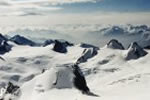


 |
 |
 |
This page sets out to provide some basic ground rules for conducting fieldwork where you have to extract information from other people.
Index
![]() When
to use a Questionnaire
When
to use a Questionnaire
![]() How
to design a Questionnaire
How
to design a Questionnaire
![]() Planning
the Fieldwork
Planning
the Fieldwork
![]() Approaching
your Audience
Approaching
your Audience
![]() Recording
the Data
Recording
the Data
![]() Data
Analysis
Data
Analysis
Some forms of fieldwork require you to ask people questions. Perhaps you want to know how people feel about a new road, or the quality of services at a holiday resort. In situations such as these, where large amounts of data are likely to be collected, it is important to make sure that you ask everyone the right questions and the same questions.
Using a questionnaire, and reading the questions from it, will ensure that every time you interview a person, you will be asking them the same questions that you asked everybody else. You won't forget any questions and you wont re-word them so that their meaning changes.
If you want to avoid a huge range of answers, you can use questions with a fixed set of possible answers, and encourage the people you interview to select one of the possible answers on your sheet.
A clipboard and a professional looking questionnaire helps to make you look 'official'. I know it sounds silly, but if you look the part, people are more willing to stop and help you. The clipboard identifies you as a researcher straight away. Some people will just ignore you if you wander up and start asking them questions without any warning.
The most important thing is to know exactly what information you need to collect. Write a list of your objectives and the types of information you will need to collect.
For example, let's pretend that you have been set a simple task :
Why do young adults visit a certain holiday beach?
You need to look for the key parts of the question. There are three main elements to your task.
Firstly, you need to go to the beach in question.
Secondly, you need to talk to young adults.
Thirdly, you need to talk to visitors, not people
who live there.
Think about what might attract young adults to a beach area. Draw up a list of possible reasons. Go to the beach a few times before you do the interviews. Look around the area and refine your ideas about why you think young adults would go there. Look to see if any of the attractions you thought of actually exist. Are there any other attractions which you'd not thought about previously? If there are, make a note of them.
Ask local people why they think young adults would visit the area. They may know of things you've neither seen nor thought about. Try to visit the local tourist information office if you can. They can provide all sorts of information about a location.
Finally, armed with all your ideas and information, you need to sit down and start to design your questionnaire. Remember that you are relying on other people giving up their time to help you, so make the questions short, precise and polite. Don't ask double questions and expect only one answer. For example, if you ask
"Do you like sunbathing and playing on the arcade machines?"you are going to get some people who want to say YES to sunbathing and NO to the arcade. If you offer them a choice of a single YES or NO answer you are going to have problems!
If you are going to offer a selection of possible answers from which people can select, remember to add a 'Don't know / Don't mind' option too.
It is a good idea to add the key questions at the start of your list. In our
example you would need to ask
"Are you a visitor here today?"
"Are you aged between 16 and 30?"
If you get a NO answer to either question you can politely thank them and explain that you need to interview only 16 to 30 year old visitors. There are few things worse than going right through your questionnaire only to discover on the last question that the person is not in the group you wanted to interview!
On the subject of age, be careful about how you ask personal questions. Some people will not appreciate being asked their exact age, how much they earn, their home address or other details which they consider to be private. Try to ask for numerical values in the form of a range. Most people are more willing to answer such questions.For example:
How old are you? Under 16 [ ] 16 to 30 [ ] Over 30 [ ]Never put the same value in two questions. This is how not to do it.
How much do you earn per year? Less than £10,000 [ ] £10,000 to £15,000 [ ] £15,000 to £20,000 [ ]Such questions cause problems when the answer lies in two groups. Which answer should be ticked for a person who earns £15,000?
Finally, read through your questions to make sure that they will get you the information you need. Get a friend to read them or, better still, persuade them to let you do a practice interview with them. Let them know that you want them to look for any mistakes, confusing wording or questions that they don't understand. This is the last stage before getting your questionnaire typed up and duplicated. You don't have to type your questionnaire, but a typed set of questions looks far more professional than some notes scribbled on the back of a scrap of paper. Looking 'official' is half the key to successful interviewing.
Think carefully about when and where you will find the type of people you want to interview. It's no good looking for people going into a bank on a Sunday afternoon for example. In our beach example, you would find most people on a sunny day during the holiday season, not during a thunder storm in mid winter.
Sort out transport, if needed, before the day arrives. Be sure that you have everything you need - questionnaire sheets, pens, more pens, clipboard, suitable clothing for any possible weather conditions and something to eat / drink. A large, clear, plastic bag is useful if there is any chance of rain. You can put the clipboard and questionnaires inside the bag along with your hand and pen. Easy writing even in the rain.
Let reliable people know where you will be, and set a time by which you will have returned. This is particularly important when you are far from home and/or in a possibly unsafe situation. It doesn't matter how confident you are, accidents can happen.
Stand where people can see you; don't suddenly jump out at them from a doorway. Always try to interview with a friend or companion. There are some strange people out there so always be safe. Don't try to approach people in dangerous places where either you or they may get hurt. Don't approach people who seem aggressive or hostile, and NEVER get into an argument with them.
Remember that you need to catch people in a good mood; you need their help and they are doing you a favour,so pick your time and location with care. People who seem relaxed and not too busy will respond better to your request than a person rushing past and obviously in a hurry.
Finally, having told you to be selective about who you ask, don't fall into the trap of only asking harmless looking people. Remember that you will probably need a good cross-section of the population if your results are going to be valid. Experience has taught me that characters cannot always be judged from clothing or how they look. If you are in a safe place don't be afraid to ask a person with blue hair and a safety pin through her eyebrow - she may be very pleasant. I have personally been helped by a skin head wearing a spiked collar, and attacked by an old lady who did some real damage with her walking stick, so don't always select your interviewees by their appearance.
As you ask questions, enter the answers straight away. NEVER rely on your memory unless there is no alternative. If you use a form of shorthand, write a key ON THE QUESTIONNAIRE. It may be a month or two before you look at the sheet again, and by then you may have forgotten exactly what 'xxx' was supposed to mean.
Briefly, make sure that you choose a form of analysis that is appropriate to the type of data you have collected. Numerical data can be represented in very many ways - make sure you select the right way.
We value
your ideas and suggestions. Please contact the
maintainer of this site.
This page
can be found at: http://www.geography-site.co.uk
Last update to
this statement was on:
February 20, 2006
© Copyright Geography Site